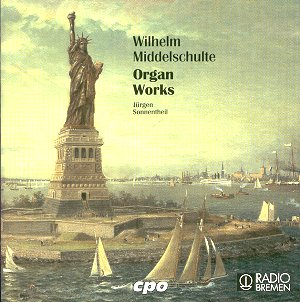Wilhelm MIDDELSCHULTE
Organ Works.
Toccata on Ein Feste Burg
Contrapuntal symphony
Two Studies Vater unser im Himmelreiche
Chromatic fantasy and fugue
Perpetuum Mobile
Chaconne
 Jurgen Sonnetheil, organ of
Gerald Woehl, Cuxhaven.
Jurgen Sonnetheil, organ of
Gerald Woehl, Cuxhaven.
 CPO 999 739-2 (DDD)
[64.17]
CPO 999 739-2 (DDD)
[64.17]
Crotchet
AmazonUK AmazonUS midprice

If ever a composer was besotted with the great J S Bach, Wilhelm Middelschulte
was. His Contrapuntal Symphony quotes 14 Bach themes. And yet his
music is not pastiche but very strong and dramatic and in this recording
both the organ and the organist are really first class.
Middelschulte was born in Westphalia in 1863 and his first teacher was August
Knabe famous for his association with the great Max Reger. He studied in
Berlin and became organist and choirmaster at St Luke's Church. His meeting
with another musician, Annette Musser, lead to his going to Chicago in 1891
where, five years later they married. She died in 1928 and the following
year Middelschulte's new wife was Florence Knox. He was for a time organist
at the cathedral of Holy Names and later taught at several American institutions
of a Roman Catholic persuasion. He edited Franz Liszt's organ works. He died
in Germany in 1943.
The sleeve note is good but it does not tell us what else he wrote apart
from the music on this disc.
The Toccata on Ein Feste Burg is a good piece although it relies a
bit on ostinati and has a broader middle section. Do we detect the Passion
Choral, O Sacred Head, sore wounded as well? The
Contrapuntal Symphony, despite its indebtedness to Bach, is a work
of academic merit. Its main thrust at the opening is a slow integration of
material but it may become dull for some. In fact it has an interesting brooding
quality with fragments of ideas, mainly Bachian, strung together. It becomes
more animated, then subsides and one waits in expectation for the piece to
take off. Will it? Won't it? The piece is rather academic in many respects.
It is afraid to be born and come out of its shell and break free into the
world of 1935. The music is anachronistic. Eight minutes in and the music
picks up. Do you recognise the theme? Is this piece going to be launched?
Will it get going? Thirteen minutes gone. Is something about to happen? Yes.
But the expectation fails after a brief stimulation. The last 75 seconds
are very, very impressive though but it was a long time coming. What an ending.
Pity about the rest, but for this 75 seconds it was worth the wait.
How do you assess a 16 minute work where only the last few moments are good?
The same problem arises with many composers. I think of a Mahler symphony
of 75 minutes duration which is alright but the last ten minutes are splendid.
I am sure that I am not the only person to just play the last 10 minutes
and forget the rest!
The brief Studies on the Chorale Vater Unser im Himmelreich begins
with the first study for pedals alone. The music is still backward looking
but demands a high level of executive skill.
Where have we heard the title Chromatic Fantasy and Fugue before?
This piece is well-conceived but it highlights again the great expectations
that the music suggests but does not quite realise. We have the obligatory
predilection for the notes B A C H and a touch of Ein Feste Burg.
Again the fantasy has a few attempts at a great final flourish but it sounds
like a necessity rather than the natural progression of the music. The fugue
is steeped in Teutonic correctness trammelled by academia but the fugue subject
is memorable! But the music meanders and gets nowhere and takes a while doing
so! The trademark of this composer is here also, the last 75 seconds are
splendid.
A Perpetuum Mobile for organ? Yes, It is the Intermezzo from
the Concerto on a theme of Bach. An Intermezzo? Really? When can a
perpetuum mobile be an intermezzo?
What is more odd is that it is scored for pedals in a virtuosic mode and
it is a showpiece. Phew! Possibly the best piece on the disc!
You must read the sleeve note about Middelschulte's eccentric student Virgil
Fox and his performance of this movement.
The Chaconne has some gorgeous chord sequences and will be of real interest
to many. I would like to get to know it..
Don't buy this record as a curiosity. Buy it for the music's sake.
I can only assume that the organist complies with the score. I like his playing
very much.
You should refer to my review of his conducting
volume three of the orchestral works of Zelenka..
David Wright

